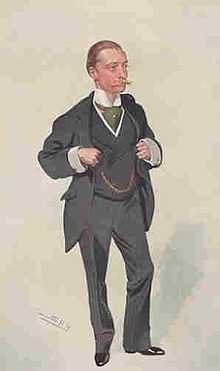Harold Tennant
| The Right Honourable Harold Tennant PC | |
|---|---|
 | |
| Harold Tennant, from photo in Scotland Office | |
| Secretary for Scotland | |
| In office 9 July 1916 – 5 December 1916 | |
| Monarch | George V |
| Prime Minister | H. H. Asquith |
| Preceded by | Thomas McKinnon Wood |
| Succeeded by | Robert Munro |
| Personal details | |
| Born | 18 November 1865 The Glen, Innerleithen, Peeblesshire, Scotland |
| Died | 9 December 1935 (aged 69) |
| Nationality | British |
| Political party | Liberal |
| Alma mater | Trinity College, Cambridge |
Harold John "Jack" Tennant PC (18 November 1865 – 9 November 1935) was a Scottish Liberal politician. He served as Secretary for Scotland under his brother-in-law H. H. Asquith between July and December 1916.
Background and education
Born at The Glen, Innerleithen, Peeblesshire,[citation needed] Tennant was a younger son of Sir Charles Tennant, 1st Baronet, by his first wife Emma, daughter of Richard Winsloe. He was the brother of Edward Tennant, 1st Baron Glenconner and Margot Asquith (and hence the brother-in-law of H. H. Asquith) and the half-brother of Baroness Elliot of Harwood.[1] He was educated at Eton and at Trinity College, Cambridge.[2]
Political career
Tennant was Assistant Private Secretary to his brother-in-law H. H. Asquith while the latter was Home Secretary between 1892 and 1895.[citation needed] In 1894 he was elected Member of Parliament for Berwickshire.[3] Asquith became Prime Minister in 1908 and in January 1909 he appointed Tennant Parliamentary Secretary to the Board of Trade. Tennant remained in this office until 1911, and then served under Asquith as Financial Secretary to the War Office from 1911 to 1912 and as Under-Secretary of State for War from 1912 to 1916. In 1914 he was sworn of the Privy Council.[4] He entered the cabinet as Secretary for Scotland under Asquith in July 1916,[5] a post he held until Asquith was ousted as Prime Minister in December 1916. Tennant did not serve under David Lloyd George.
Tennant lost his seat in parliament at the 1918 general election.
| General Election 1918: Berwick and Haddington [6] | |||||
|---|---|---|---|---|---|
| Party | Candidate | Votes | % | ±% | |
| Coalition Liberal | John Deans Hope | 8,584 | |||
| Labour | R.W. Foulis | 4,783 | |||
| Liberal | Rt Hon. Harold John Tennant | 2,567 | |||
| Majority | |||||
| Turnout | |||||
| Coalition Liberal hold | Swing | ||||
He also unsuccessfully contested Glasgow Central in 1923[7] but never returned to the House of Commons.
Personal life

He married factory inspector May Abraham in 1896. Tennant bought Great Maytham Hall, Rolvenden, Kent in 1910. He commissioned Edward Lutyens to rebuild the hall at a cost of £24,000.[8] Tennant died in November 1935, aged 70.
References
- ↑ thepeerage.com Rt. Hon. Harold John Tennant
- ↑ "Tennant, Harold John (TNNT885HJ)". A Cambridge Alumni Database. University of Cambridge.
- ↑ leighrayment.com Bedford to Berwick upon Tweed
- ↑ leighrayment.com Privy Counsellors 1836-1914
- ↑ The London Gazette: no. 29667. p. 6975. 14 July 1916.
- ↑ Whitaker's Almanack, 1920
- ↑ The Times, 8 December 1923
- ↑ Tyzack, Anna (1 July 2009). "The Secret Garden for sale". London: Daily Telegraph. Retrieved 23 November 2010.
- Torrance, David, The Scottish Secretaries (Birlinn 2006)
| Parliament of the United Kingdom | ||
|---|---|---|
| Preceded by Hon. Edward Marjoribanks |
Member of Parliament for Berwickshire 1894–1918 |
Constituency renamed Berwick and Haddington |
| Political offices | ||
| Preceded by Hudson Kearley |
Parliamentary Secretary to the Board of Trade 1909–1911 |
Succeeded by J. M. Robertson |
| Preceded by Francis Dyke Acland |
Financial Secretary to the War Office 1911–1912 |
Succeeded by Harold Baker |
| Preceded by J. E. B. Seely |
Under-Secretary of State for War 1912–1916 |
Succeeded by The Earl of Derby |
| Preceded by Thomas McKinnon Wood |
Secretary for Scotland July - December 1916 |
Succeeded by Robert Munro |
| ||||||||||||||||||||||||
| |||||||||||||||||
.svg.png)